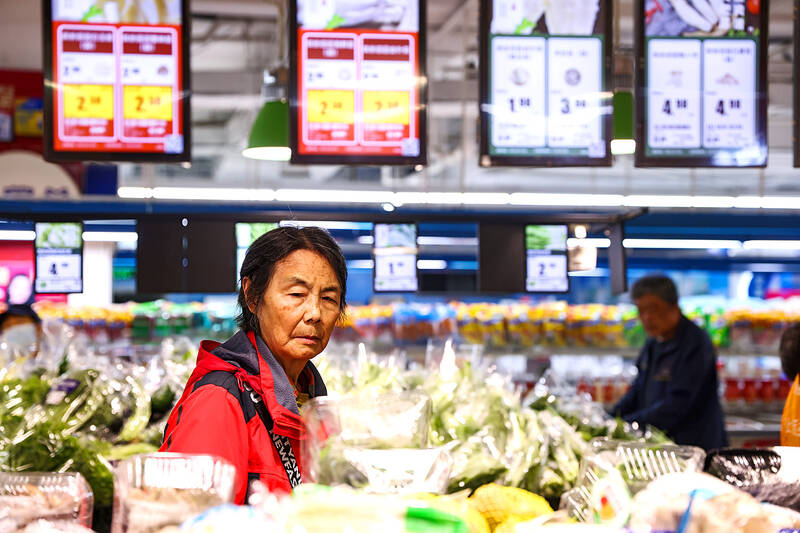China’s consumer deflation extended for a third month last month, as punitive tariffs imposed by the US add to a drag on prices from weak domestic demand.
The consumer price index fell 0.1 percent from a year earlier, the Chinese National Bureau of Statistics said on Saturday, similar to the drop in the previous month.
Factory deflation persisted for a 31st month, with the producer price index recording a decline of 2.7 percent compared with 2.5 percent in March.

Photo: EPA-EFE
Deflationary pressures are likely to linger and possibly get worse after US President Donald Trump took aim at most Chinese exports with a 145 percent tariff last month, provoking Beijing to retaliate in kind. The trade war could encourage some companies to offload their products at home, exacerbating already-fierce competition that might push firms to lower prices even further.
“Policy efforts to boost consumption since the fourth quarter of last year still appear to be failing to get much traction,” Bloomberg Economics economist David Qu (曲天石) wrote in a note on Saturday. “The key will be for the government to increase fiscal support quickly — especially if negotiations with the US fail to bring material relief on tariffs.”
Losses in jobs and incomes due to US tariffs might also weaken the ability and willingness of Chinese consumers to spend, likely prompting manufacturers and service providers to cut prices.
China’s economy continued to struggle from deflation in the first first three months of the year, reflecting an imbalance between supply and demand.
The GDP deflator — a broad measure of prices across the economy — declined for the eighth consecutive quarter, the longest streak since the quarterly data began in 1993.

NEW IDENTITY: Known for its software, India has expanded into hardware, with its semiconductor industry growing from US$38bn in 2023 to US$45bn to US$50bn India on Saturday inaugurated its first semiconductor assembly and test facility, a milestone in the government’s push to reduce dependence on foreign chipmakers and stake a claim in a sector dominated by China. Indian Prime Minister Narendra Modi opened US firm Micron Technology Inc’s semiconductor assembly, test and packaging unit in his home state of Gujarat, hailing the “dawn of a new era” for India’s technology ambitions. “When young Indians look back in the future, they will see this decade as the turning point in our tech future,” Modi told the event, which was broadcast on his YouTube channel. The plant would convert

‘SEISMIC SHIFT’: The researcher forecast there would be about 1.1 billion mobile shipments this year, down from 1.26 billion the prior year and erasing years of gains The global smartphone market is expected to contract 12.9 percent this year due to the unprecedented memorychip shortage, marking “a crisis like no other,” researcher International Data Corp (IDC) said. The new forecast, a dramatic revision down from earlier estimates, gives the latest accounting of the ongoing memory crunch that is affecting every corner of the electronics industry. The demand for advanced memory to power artificial intelligence (AI) tasks has drained global supply until well into next year and jeopardizes the business model of many smartphone makers. IDC forecast about 1.1 billion mobile shipments this year, down from 1.26 billion the prior

People stand in a Pokemon store in Tokyo on Thursday. One of the world highest-grossing franchises is celebrated its 30th anniversary yesterday.

Zimbabwe’s ban on raw lithium exports is forcing Chinese miners to rethink their strategy, speeding up plans to process the metal locally instead of shipping it to China’s vast rechargeable battery industry. The country is Africa’s largest lithium producer and has one of the world’s largest reserves, according to the US Geological Survey (USGS). Zimbabwe already banned the export of lithium ore in 2022 and last year announced it would halt exports of lithium concentrates from January next year. However, on Wednesday it imposed the ban with immediate effect, leaving unclear what the lithium mining sector would do in the